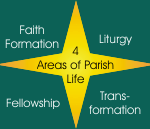

 |
|
 |
|
Homily for October 16th, 2005.
Caution: Putting a Sunday homily on the Website is tricky business. All the viewer has is a written text. A homily, on the other hand, is "an oral event". It may not have been said or heard the way it was written. In addition, a roughly ten-minute homily is part of a roughly one-hour worship event in which God and God's people communicate with each other by means of ritual, symbol, song, proclamation, prayer. Not everything in these homilies is original. As a homilist, I rely on and at times borrow from other homilists and writers who are not properly mentioned in this format. I am often indebted to them. Father William Marrevee, s.c.j.
29th Sunday Ordinary Time Year A That line of Jesus in today’s Gospel “Give to the emperor what belongs to the emperor, and give to God what belongs to God” is very well known. Even those who know very little of the Gospels may have heard or used that line. What intrigues me is the argument that Jesus uses. Our money bears the image of the emperor, the imprint of the state. Hence, we pay taxes… But then Jesus continues: Give to God the things that belong to God. I like to think that there is some justification in using the same argument: Give to God the things that bear God’s image. Is there anything that bears the image of God? And that as a result we owe it to God? If that is a fair question to ask, then I cannot help but think of the fact that we as human beings bear the image of God. As the creation story in the Bible has it: we are created in God’s image and likeness. We bear God’s image. That has some important implications. What God is entitled to receive from us is a well-cared for human life for all. God is entitled to that because humanity, all of us bear the image of God. What God wants back from us, the kind of worship/obedience that God expects from us is a society, in which all human beings can live in freedom, in dignity, in justice, in peace. That is the tax we owe to God. How do you suppose such a society comes about? By the political and economic choices we make. After all, the shape our society is in is not given by God, but is one we make by our choices; and these choices have religious implications. It is true that in some circles they would argue that the line of Jesus in today’s Gospel “Give to the emperor what belongs to the emperor and to God what belongs to God” clearly indicates that Jesus wants to see our civic responsibilities and our religious obligations separated. Supposedly Jesus does not want to see religion/faith mix with politics. I think that is a seriously distorted interpretation. It seems to me that what Jesus really does here is placing our civic responsibilities in a religious context. The two cannot be separated. On the contrary; for those, who believe that human beings, all human beings are created in God’s image and likeness, our civic responsibilities have a religious quality; as such there is even a greater urgency to them. When, with our political and economic choices, we provide for the hungry, shelter for the homeless, health care facilities for the sick, education for the underprivileged, then we are really giving to God what belongs to God. But that means as well that as long as our political and economic choices protect our own self-interests and keep adding to our relative affluence, and all that at the expense of those who are in need --, then our worship of God is not yet authentic and we have not yet paid our tax to God. “Give the Lord glory and honour” we sang as today’s response to the psalm. Yes, but we give God glory and honour not just by our singing that line, but also by the way we concretely care for all who bear God’s image. |
|||||
| © Copyright 2025 Our Lady of Victory / St-Malachy Site
490 Charles Street • Gatineau • Quebec • J8L 2K5 Telephone: (819) 986-3763 Website powered by Arvixe Web Hosting |